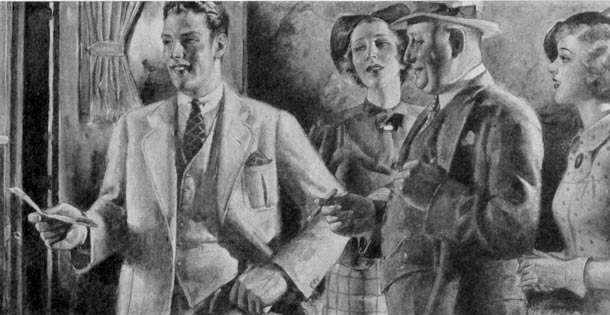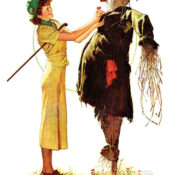In 1930s, humorist J.P. McEvoy wrote the Post column “Father Meets Son” presented to readers in the form of letters filled with advice for navigating life’s rocky road. Employing a mix of wry humor and tough love, Dad doled out life lessons on everything from work to women. Readers loved it.
While his son suffers under the terrible taskmaster that is his new supervisor, Dad reveals the two words that can win almost any argument with one’s boss.
Father Meets Son: Separated from Love
By J.P. McEvoy
Originally published on June 26, 1937
Dear Son: Of course you are depressed that her father should separate you from your loved one by many miles of cruel distance and many weeks of cruel, cruel time. And why should it be necessary to start you at the bottom, with only a drawing account so small that it barely supplies you with the necessities of life? And why add insult to injury by putting you under a branch manager who is the legendary slave driver and man-killer of the entire sales force — an ogre who has never been known to say a kind word or do a good deed?
Well, I can’t do anything about your heartaches over your girl, but I can save you a lot of headaches over your boss — this one or any other one. For, rest assured, you will always have a boss over you, just as your boss will always have a boss over him, whether it is the president or the directors or the bankers. And that is the secret of getting along fine with him. Realizing that he has a boss who is probably riding him just as hard as he is riding you.
When your new hard-boiled bass is trying to get more sales out of you, just imagine you are sitting behind the desk and he is standing in front of it. The home office is hammering you for results and you can’t deliver them unless this fellow on the other side of the desk brings in his share. Get that picture in your mind and it will do you and the boss and the company a lot more good than grousing. There are at least two sides to every question. There are certainly two sides to every desk — your side and the boss.
When the boss jumps all over you with his boots on, you can be sure there is nothing personal in it. He isn’t doing it because he dislikes your taste in ties or because your hair is curly. And instead of thinking up snappy comebacks, say something to this effect: “You’re right. I haven’t come up to your expectations, but I have tried. I am going to keep on trying. I want to help you. You have a much harder job than I have. I appreciate the good advice you have given me, and I hope you will not become too discouraged to continue it.”
You can’t talk like that to your boss? Well, maybe you can’t at first, but think it, anyway. Let whatever you have to say come from that kind of thinking. It will govern what you say, it will mold it and give it the right tone. Later you will be able to say it simply, easily, naturally — and mean it. Note that the little speech started off with just two words: “You’re right.” Believe me, son, you can win more arguments with any kind of a boss by admitting, right off the bat that he’s right. Once you have taken the wind out of his sails, you can bring him about and steer him almost anywhere you like. Start right off and say, “You’re right.” Then you may go on and say, “But don’t you think that —” Not, “I think that —” Always “You.” Never “I.” All of us are egocentric, bosses nothing but. They think “ I, I, I.” They are not interested in you. But if you, too, think “I, I,” you’ll never get together.
Give your boss a lot of thought. Try to understand what makes him act that way. Is he grouchy? It may be a weak stomach or a strong wife. Does he fly off the handle and go into rages? His boss may be on his neck. Give your boss a break. He may not show his appreciation to you, but he can’t help but feel it. I have been on both sides of many desks and my experience has been that the boss is like the village maiden in the old song: “More to be pitied than censured, more to be helped than despised.”
Meanwhile, her father is giving you the chance to make good for him while you are making good for her. Learning to sell his customers will teach you to sell him. And you will discover no better way to learn what your fellow men are like than by trying to sell them something they don’t want. Which means trying to sell them almost anything, for people really don’t crave anything so much as to be let alone.
Fortunately, your father-in-law-elect is in a business that is rooted in a fundamental hunger. We are told that self-preservation and reproduction of our kind are the two basic instincts, but, surely, the deep desire for change is basic too. The peat migrations of history are too easily explained as quests for happier hunting grounds or greener pastures. It is just as likely the Huns were bored stiff with the same old scenery, and the Gauls were only trying to “get away from it all.” So your father-in-law-elect hitched a new wagon to an old star when he went into the business of building and selling trailers.
As a junior salesman in this field, you certainly have two strikes on most of the lads who roam the world trying to sell people ideas they heartily dislike. You’ll be paid to convince people that hills look green far away. They know it! That people who have to stay in one place are to be pitied, while people who are free to follow the sun are envied. They know that too. You have to bait them with the lure of the open road. They’ll take the bait, and the rod and the reel, too, if you don’t hang on.
Our country was settled by people who couldn’t stay at home. It was settled in the East by people who couldn’t stay put in Europe — and settled in the West by their children who couldn’t stay put in the East. It was no chore to sell covered wagons to our forefathers; it should be much simpler to sell trailers to their descendants.
Especially now that you will be making good not only for yourself but for her, I suspect it will put a new glint in your eye and new power in your elbow. Nothing like girlish cries of encouragement from the stands to rough up the game. History tells us the combats of the gladiators were mild affairs until the vestal virgins were the guests of honor. And we all know the stimulating effect of the dark-eyed senorita in the box on the dark-eyed matador in the bullring.
If men were left to themselves they would go right back to their caves and gnaw bones. It is the little woman who has prodded and goaded them to hunt trophies and gather booty, to fight for a place in the sun when they would rather sleep in the shade. Bringing home a new head from the neighboring tribe or a new icebox from the neighboring store, is equally arduous for the male, and, in his private opinion, equally uncalled for. But the little woman is more acquisitive, more ambitious, more concerned with keeping up with the Joneses in the next cave, or the next bungalow.
And a good thing too. Or is it?
Affectionately,
Dad
Previous: Being in Love
Coming soon: Professionalism and Appearances
Become a Saturday Evening Post member and enjoy unlimited access. Subscribe now



